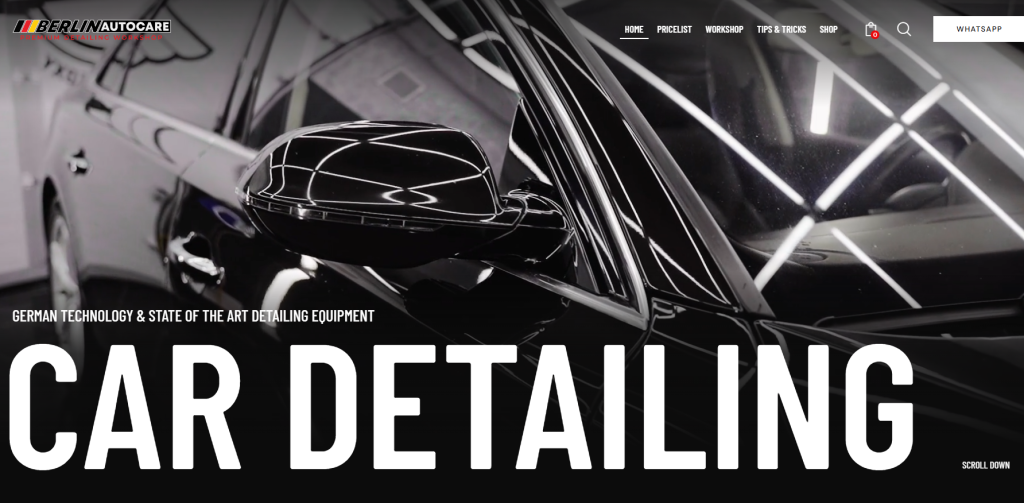
When I started detailing cars back in the early 80s, certification wasn’t even a thing. You learned by doing—messing up a few engines, buffing a couple of paint jobs wrong, and figuring out the hard way. Today, the industry is different. Certification isn’t just a piece of paper—it’s proof that you know your craft, that you’re trustworthy, and that clients can rely on you.
If you’re serious about launching a career in auto detailing, whether in a shop or on your own, getting certified can set you apart. In this guide, I’ll walk you through everything you need to know, share insider tips I’ve learned over decades, and help you avoid the mistakes I made when I was starting out.
Why Get Car Detailing Certification?
You might ask, “Do I really need it?” Here’s why it matters:
- Credibility: Certification shows clients you know your stuff.
- Higher Earnings: Certified detailers often charge more per job.
- Access to Training & Tools: Many certifications include hands-on workshops and industry discounts.
- Professional Growth: Keeps you updated with new products, technology, and techniques.
- Insurance Benefits: Some insurance companies offer better rates for certified professionals.
Think of it as giving your career a tune-up—it makes everything run smoother.
Step 1: Research the Right Certification
Not all certifications are created equal. Here’s a breakdown of popular options:
- International Detailing Association (IDA)
- Widely recognized in the US and globally.
- Offers courses in paint correction, ceramic coating, interior detailing, and more.
- Online and in-person options.
- Autogeek Detailing Certification
- Focuses on practical hands-on skills.
- Good for beginners and pros looking to refine their techniques.
- SAPA Detailing Academy (Europe-based)
- Offers intensive workshops and European certification.
- Local Technical Schools or Community Colleges
- Often offer automotive detailing or auto body courses.
- Cheaper than international programs and great for networking locally.
Pro Tip: Always check if the certification is recognized in your region. A certificate that’s valuable in California may not carry the same weight in Michigan or abroad.
Step 2: Evaluate Your Current Skills
Before enrolling, assess your skills honestly:
- Can you polish a car to mirror-like perfection?
- Do you know the difference between wax, sealant, and ceramic coating?
- Are you comfortable handling leather, fabrics, and plastics without damage?
- Can you troubleshoot paint defects like swirl marks or water spots?
Certification programs often require a baseline level of competence. If you’re a beginner, consider starting with introductory courses or online tutorials before jumping into advanced certification.
Step 3: Choose a Learning Format
Certifications come in two main flavors:
- Online Courses
- Flexible and self-paced.
- Often cheaper.
- Limitations: Lack of hands-on practice; you may need to practice on your own vehicles.
- In-Person Workshops
- Hands-on experience with expert instructors.
- Networking opportunities.
- Often more expensive but worth the investment.
Mini Story: I remember attending my first in-person workshop in 1995. Watching a pro polish a BMW hood to perfection in just 20 minutes was a game-changer. I learned more in that day than I did in weeks of trial and error.
Step 4: Gather Required Materials
Depending on the certification, you may need:
- A detailing kit (buffers, polishers, microfiber towels, cleaning solutions).
- A test vehicle (sometimes your own car is allowed).
- Protective gear (gloves, eye protection).
- Notebook or tablet for taking notes.
Pro Tip: Don’t skimp on quality. Cheap tools can ruin your learning experience—and your car.
Step 5: Complete the Coursework
- Theory: Learn about paint types, coatings, detailing chemicals, and interior care.
- Hands-On Practice: Buffing, polishing, vacuuming, stain removal, engine bay cleaning.
- Exams: Some programs require written tests and practical demonstrations.
Remember, this is where experience counts. Don’t rush. Take your time to perfect every step.
Step 6: Pass the Assessment & Earn Your Certification
Most programs will evaluate:
- Knowledge of products and techniques
- Practical skills on a vehicle
- Safety and environmental awareness
Passing earns you a certificate, which can boost your resume, website credibility, and client trust.
Step 7: Post-Certification Steps
Once certified, consider these:
- Market Your Certification: Add it to your website, social media, and business cards.
- Continue Learning: Certifications expire or get outdated. Take refresher courses or advanced training.
- Network: Attend detailing expos, online forums, and local events.
Common Mistakes to Avoid
- Skipping Hands-On Practice: Theory alone won’t make you a pro.
- Choosing the Wrong Program: Not all certifications carry the same weight.
- Ignoring Local Regulations: Some states require licensing to run a business.
- Neglecting Safety Protocols: Chemicals and machines can be hazardous.
- Assuming Certification Equals Mastery: Experience and ongoing learning are key.
DIY vs Professional Training
While you can learn a lot from YouTube or forums, professional certification offers:
- Structured learning
- Expert feedback
- Proof of credibility
DIY is fine for hobbyists or small gigs, but certification helps you command higher rates and win serious clients.
Future Trends in Auto Detailing
- EV Detailing: Electric cars have unique cleaning needs, especially for battery compartments and delicate interiors.
- AI & Smart Tools: Some advanced polishers now use AI sensors for perfect pressure.
- Eco-Friendly Products: Certifications increasingly cover sustainable detailing methods.
Insider Hacks from a Veteran
- Use microfiber towels for every surface—saves paint and your back.
- Label your chemical bottles clearly to avoid accidents.
- Always start with the cleanest vehicle possible before polishing.
- Take before-and-after photos for clients—it sells your skills.
- Join online communities—learn new techniques faster than any course alone.
FAQ Section
Q1: How long does it take to get certified?
A: Depends on the program—online courses can take a few weeks, in-person workshops a few days.
Q2: Do I need prior experience?
A: Beginner courses are available, but most certifications expect basic skills.
Q3: How much does certification cost?
A: Anywhere from $200 for online courses to $2,000+ for advanced in-person workshops.
Q4: Will certification increase my income?
A: Yes, certified detailers can charge 15–50% more than uncertified ones.
Q5: Can I use certification internationally?
A: Some certifications are globally recognized, but check local regulations.
Key Takeaways
- Certification builds credibility, skills, and income potential.
- Research the right program before committing.
- Hands-on practice is essential.
- Keep learning—even after certification, trends and products evolve.
- Market your certification to attract clients and grow your business.
Conclusion
Getting certified in auto detailing is like tuning an engine—you may not notice the improvement immediately, but your career will run smoother, faster, and more efficiently. From my first workshop in the 90s to modern EV detailing techniques, I’ve seen how proper training transforms a hobbyist into a trusted professional.
If you’re ready to elevate your detailing skills, invest in certification, keep practicing, and stay connected with the industry. Your clients—and your wallet—will thank you.

